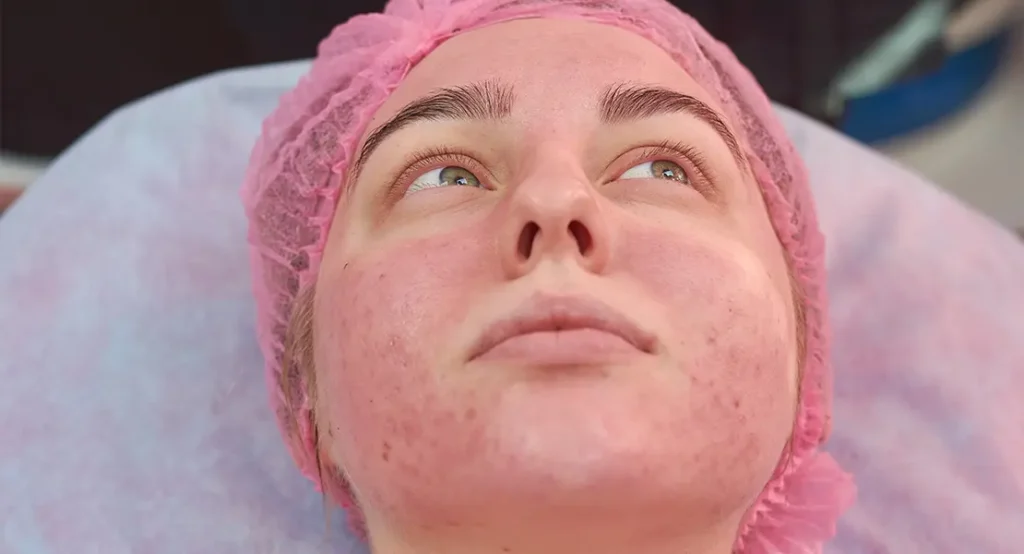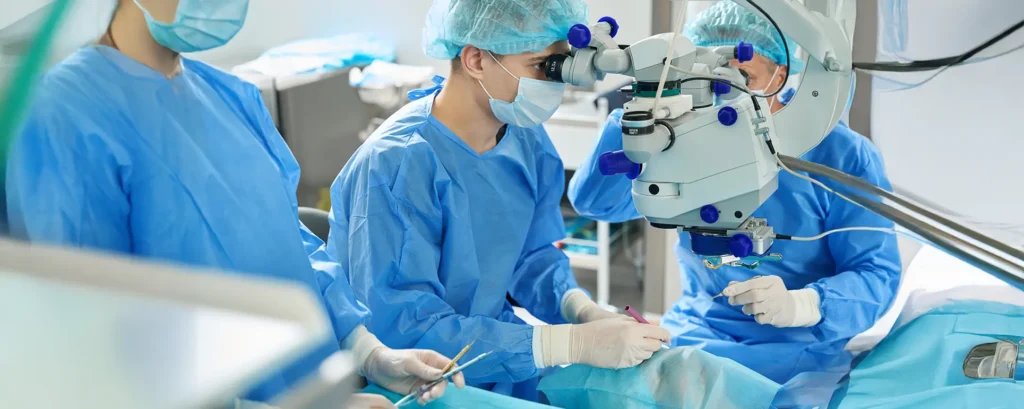If you’re living with rosacea and have now been told you need cataract surgery, you’re probably wondering what that means for your eyes. Will the surgery make your symptoms worse? Will your ocular rosacea affect the healing process? Or maybe you’re dealing with persistent eye dryness, irritation, or even blepharitis, and you’re concerned about how all that will play into surgery. The good news is that having rosacea doesn’t mean you can’t have successful cataract surgery. But it does mean your care team needs to take extra steps to protect your eyes — before, during, and after the procedure.
In this guide, we’ll walk you through how rosacea — particularly ocular rosacea — intersects with cataract surgery. We’ll explore what preparations may be needed, what risks you should be aware of, how your recovery might differ, and what strategies are in place to keep your eyes calm and comfortable.
Understanding Ocular Rosacea and Why It Matters for Surgery
Rosacea isn’t just a skin condition. For many people, it also affects the eyes — a form known as ocular rosacea. This can cause a range of symptoms, including dry eyes, eyelid inflammation (blepharitis), a gritty feeling, red or bloodshot eyes, and light sensitivity. These symptoms come and go but can become more persistent or severe over time.
For cataract surgery, ocular rosacea becomes particularly relevant because the surface of the eye — including the tear film and eyelids — needs to be in good condition to promote smooth healing. Inflammation or dryness can make the eye more sensitive to surgery, and if left untreated, may increase the risk of post-operative complications like delayed healing, discomfort, or even infection.
Pre-Operative Planning: Managing Rosacea Before Surgery

Before cataract surgery, your ophthalmologist will likely assess the health of your ocular surface. If you have active signs of rosacea, including lid inflammation or dry eye, these issues are typically treated ahead of time. The aim is to reduce any underlying inflammation, stabilise the tear film, and get the eyes in their best possible shape before surgery.
This may involve warm compresses, lid hygiene routines, prescription eye drops (such as ciclosporin or lifitegrast), or even a short course of oral antibiotics like doxycycline — known to help with both lid inflammation and meibomian gland dysfunction. In some cases, IPL (intense pulsed light) treatment for rosacea may even be considered as a preoperative measure, depending on the severity of your symptoms.
The Day of Surgery: Adapting Techniques for Sensitive Eyes
On the day of surgery, your cataract surgeon will make certain adjustments if you have rosacea-related eye issues. This might include choosing anaesthetic and antiseptic agents that are less irritating to a sensitive ocular surface. The surgical team will also take extra care to protect the eye from drying out during the procedure — especially if you’re prone to dry eyes or meibomian gland dysfunction.
If your rosacea has affected the eyelids or lash line, particular attention will be paid to sterilising this area to prevent bacteria from entering the eye. In some patients, a gentle lid cleaning with diluted povidone-iodine may be done prior to surgery. All of this is designed to minimise the risk of infection and keep inflammation at bay.
Post-Surgical Healing: Avoiding Flare-Ups and Irritation
After the surgery, your eyes may feel a bit gritty or sore — which is entirely normal. But if you have rosacea, there’s a higher chance that your ocular surface may react more strongly than usual. This is why post-operative care is carefully tailored to avoid exacerbating dryness or irritation.
In addition to the standard antibiotic and steroid eye drops used after cataract surgery, you may also be prescribed preservative-free artificial tears to use frequently throughout the day. These help keep the eye lubricated and reduce surface friction. In some cases, additional anti-inflammatory treatments specific to rosacea may be reintroduced — such as low-dose oral doxycycline — especially if symptoms flare up again in the weeks following surgery.
Tear Film Stability and Meibomian Gland Health
The meibomian glands in your eyelids are responsible for producing the oily layer of your tear film, which prevents your tears from evaporating too quickly. In rosacea patients, these glands often become blocked or dysfunctional, which can destabilise the tear film and lead to dry, inflamed eyes.
Ensuring these glands are functioning properly before surgery is important. Your doctor may recommend warm compresses and eyelid massages, sometimes combined with gland expression or advanced in-clinic treatments like LipiFlow. By supporting tear film stability before cataract surgery, you’re giving your eyes a much better chance of healing comfortably.
Reducing the Risk of Infection and Inflammation

Because the skin and eyelids in rosacea can harbour more bacteria due to chronic inflammation or blepharitis, there’s a slightly increased risk of infection after cataract surgery. This doesn’t mean you’re at high risk — just that the usual precautions need to be stepped up a bit.
This often includes a longer pre-surgical cleaning regimen, and in some cases, a prophylactic antibiotic course taken orally. After surgery, your doctor may schedule more frequent follow-up visits to check on healing progress and spot any early signs of infection or inflammation before they become problematic.
Lifestyle Tips to Support Your Eyes Before and After Surgery
Managing rosacea isn’t just about prescriptions — your daily routine plays a big role too. And when you’re heading into eye surgery, it’s a good time to reassess some of your lifestyle habits that could be quietly sabotaging your eye health. Things like alcohol, spicy food, hot beverages, and prolonged sun exposure are well-known rosacea triggers — and they can all affect your recovery too by promoting inflammation.
Make hydration a priority, especially in the days before surgery. Keeping your body well-hydrated supports your tear film and can make a surprising difference in post-op comfort. If you’re using a humidifier at home, keep it going during recovery — it helps reduce tear evaporation. Avoid hot yoga, saunas, or intense workouts in the first couple of weeks post-surgery, as they can promote flushing and dry eyes. Finally, try not to rub your eyes, even if they feel gritty — it’s one of the easiest ways to disrupt healing and increase inflammation, especially if rosacea is already making your lids more sensitive.
Preservative-Free Is the Way to Go
If you have rosacea, particularly ocular rosacea, you’re probably already sensitive to preservatives found in eye drops. After cataract surgery, you’ll be using drops several times a day, so your doctor will likely recommend preservative-free versions to reduce irritation and keep your eyes as calm as possible.
These drops come in single-use vials and are just as effective as regular drops — but without the added chemical preservatives that can sometimes make rosacea symptoms worse. Some surgeons even provide a post-op plan that includes lubricating eye gels at night to prevent overnight dryness.
Cataract Surgery and Skin Rosacea Triggers
If your rosacea is mostly facial, you may still wonder whether cataract surgery could trigger a skin flare-up. The surgery itself is unlikely to directly worsen your skin, but stress — whether physical or emotional — can be a known trigger. It helps to have your skin rosacea well-managed before the operation. Use your usual skincare regime unless your doctor advises otherwise, and avoid introducing new products immediately after surgery.
Hydration, sun protection, and gentle skincare should be continued, and if you’re prone to flushing or skin irritation, consider bringing this up with your doctor so they can avoid medications that might potentially trigger a flare.
Visual Outcomes: What to Expect
Rosacea doesn’t affect the lens of your eye — so in most cases, your visual outcome after cataract surgery should be just as good as it would be for someone without the condition. However, if ocular rosacea is active, or if there’s significant surface inflammation, your vision may take slightly longer to stabilise during recovery.
Fluctuations in the tear film can cause intermittent blurring even after a technically perfect cataract procedure. But don’t worry — this is usually temporary. With proper treatment of the ocular surface, your vision typically clears as your eyes settle down. Some people with rosacea also experience light sensitivity (photophobia), which may persist for a few weeks post-op but generally improves as the eye heals.
Customising Your Lens Choice
If you’re choosing between different intraocular lens (IOL) types — such as monofocal, multifocal, or toric — your ocular surface health will influence the decision. For patients with unstable tear film or frequent dryness due to rosacea, your surgeon may lean toward monofocal or toric lenses, which tend to be more forgiving in terms of visual fluctuations.
Multifocal lenses require a very stable ocular surface to deliver the sharpest outcomes, and in some cases, ocular rosacea may make that less predictable. But every case is unique, and your surgeon will guide you through the best option based on your eye health and lifestyle needs.
Hormonal Rosacea and Its Impact on Cataract Surgery
If your rosacea tends to flare around hormonal changes — such as menopause, menstruation, or even certain medications — you’re not alone. Many people experience what’s often called hormonal rosacea, and while it’s not officially a separate diagnosis, the pattern is well recognised. These hormonal fluctuations can sometimes influence not just facial symptoms, but eye dryness and sensitivity too.
When planning cataract surgery, it’s important to let your surgeon know if you’ve noticed this hormonal link. For example, if you’re on hormone replacement therapy (HRT) or other hormone-altering medications, they may want to review how these could be affecting your ocular surface. The timing of your surgery might even be adapted to avoid flare-prone windows — especially if your eyes are known to feel worse during certain phases of your cycle. While it might not always be possible to avoid these completely, being aware of the pattern helps your surgical team prepare the right post-operative care plan for you.
FAQ: Cataract Surgery and Rosacea
- Can I have cataract surgery if I have rosacea?
Yes, you absolutely can. However, your ophthalmologist will likely want to treat any active ocular symptoms — such as dryness or inflammation — before proceeding, to ensure your eyes are in the best possible condition for surgery. - Will cataract surgery make my rosacea worse?
The surgery itself doesn’t usually worsen rosacea, but post-op stress or certain drops might temporarily irritate sensitive eyes. Your care team can tailor treatment plans to avoid common rosacea triggers and flare-ups. - Should I stop my rosacea treatments before surgery?
Not necessarily. Some topical treatments may need to be paused around the time of surgery, especially if they’re close to the eyes, but systemic medications like doxycycline are often continued — or even started — to help with healing. - How is the surgery different for people with ocular rosacea?
The procedure itself is often similar, but extra precautions are taken to minimise irritation. This can include using preservative-free drops, avoiding certain anaesthetics, and ensuring the tear film and lids are well-managed before surgery. - Will my recovery take longer?
Recovery might feel a little slower if you have rosacea-related dry eye, as fluctuating tear quality can delay clear vision. That said, most people still recover well with the right treatment and follow-up. - Are there special eye drops I should use?
Yes. Preservative-free artificial tears are often recommended both before and after surgery. You may also be given anti-inflammatory drops tailored to your condition to help keep the ocular surface calm. - What happens if I have a rosacea flare after surgery?
Flare-ups can happen, but they’re usually manageable with the right treatment. Your eye doctor may adjust your medication, reintroduce anti-inflammatories, or schedule additional follow-ups to make sure you’re healing smoothly. - Can I wear makeup after cataract surgery?
It’s best to avoid makeup — especially around the eyes — for at least a week or two after surgery. Once your surgeon gives the green light, stick to hypoallergenic and non-irritating products if you’re prone to rosacea flare-ups. - Should I tell my surgeon about my rosacea even if it’s mild?
Yes — always mention it. Even mild rosacea can affect the tear film or eyelids, and your surgeon will want to account for that in your surgical plan and post-op care. - Will I need more check-ups than usual?
Possibly. People with ocular rosacea often benefit from more frequent follow-up visits, especially if they’re prone to post-op inflammation or dryness. This allows any problems to be spotted and treated early.
Final Thoughts
Living with rosacea means your eyes need a bit of extra TLC — and that’s especially true when you’re heading into cataract surgery. But with the right preparation, a tailored surgical plan, and post-op care that supports your ocular surface, there’s no reason you can’t have excellent visual outcomes. The key is communication. Be sure your cataract surgeon knows about your rosacea — even if it seems mild — and follow their guidance on preparing your eyes in the weeks before surgery.
If you’re considering cataract surgery and live with rosacea, you’re welcome to reach out to the team at London Cataract Centre for personalised advice and support. With careful planning, we’ll help ensure your eyes stay healthy and your vision clear.
References
- Foulks, G. N. and Wojciechowski, R. (2014) Cataract surgery in patients with ocular surface disease. The Ocular Surface, 12(4), pp. 221–232. Available at: https://www.ncbi.nlm.nih.gov/pmc/articles/PMC4181461/
- Thibos‑Mackenzie, C., Farcomeni, J., and Hatch, K. (2024) Dry eye post‑cataract surgery: a systematic review and meta‑analysis. BMC Ophthalmology, 24:184. Available at: https://bmcophthalmol.biomedcentral.com/articles/10.1186/s12886-024-03841-8
- Akpek, E. K. and Smith, R. (2023) Ocular rosacea: An updated review. Therapeutic Advances in Ophthalmology, 15. Available at: https://www.ncbi.nlm.nih.gov/pmc/articles/PMC11872267/
- Perry, A. (2022) ‘Ocular rosacea must be treated months before cataract surgery,’ in Signs of Rosacea—and How to Treat. EyeWorld, 2022. Available at: https://www.eyeworld.org/2022/signs-of-rosacea-and-how-to-treat/
- Presbyopia Physician (2023) Ocular surface and lid margin optimization prior to refractive cataract surgery. Presbyopia Physician, December 2023. Available at: https://www.presbyopiaphysician.com/issues/2023/december/ocular-surface-and-lid-margin-optimization-prior-to-refractive-cataract-surgery/

